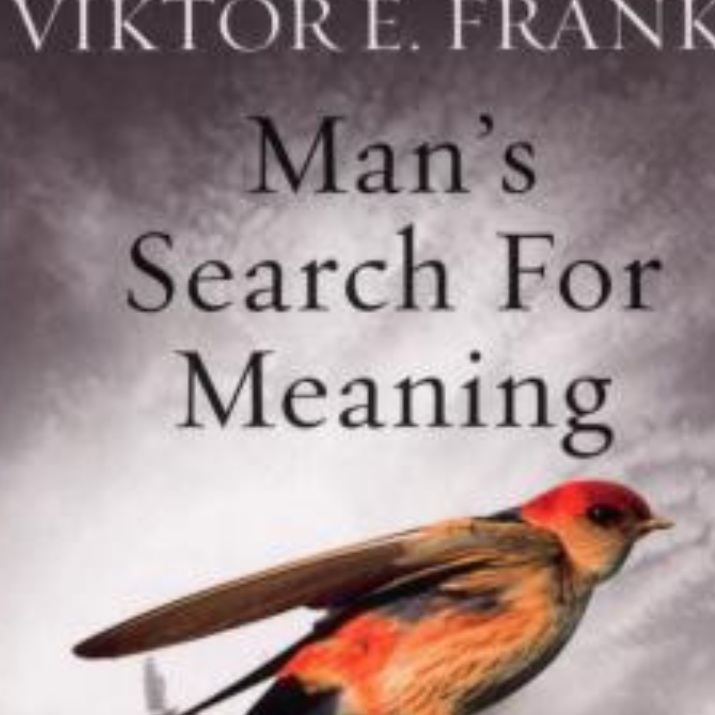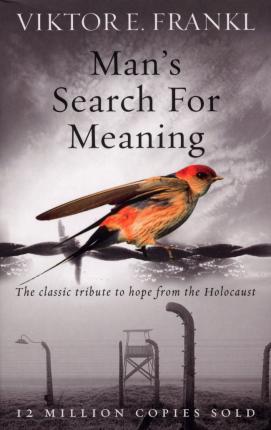Man’s Search For Meaning : The classic tribute to hope from the Holocaust is one of my all time favourite books. Every time I read it I take something more away from it. It is a book I want all my kids to read.
Victor Frankl was a Professor of Nuerology and Psychiatry at the University of Vienna Medical School. During World War II he spent three years at Auschwitz, Dachau and other concentration camps.
Frankl says the essay will try to answer the question:
how was everyday life in a concentration camp reflected in the mind of the average prisoner?
Reading about how and his fellow prisoners were treated is still shocking regardless of how many stories or movies I have seen depicting this. The ability of humans to inflict this onto other humans is so unfathomable to me. But it is not this on which Frankl wants us to dwell, so when I read the book, I choose not to do so, but dwell on the amazing ability for humans to adapt and survive.
Each time I revisit this book it gives me a better sense of perspective. The book is in two parts – the first being Experiences in a Concentration Camp and the second, Logotherapy in a Nutshell. Below I have written some of my favourite quotes from each section and a note about it.
Experiences in a Concentration Camp
The salvation of man is through love and in love.
Frankl was separated from his wife when he entered the first concentration camp and had no idea if she were alive or dead. He did not forget about her, but “clung” to his wife’s image and would even talk to her. His thoughts and love for his wife was something that couldn’t be touched or tainted by his environment.
Thus suffering completely fills the human soul and conscious mind, no matter whether the suffering is great or little. Therefore the ‘size’ of human suffering is absolutely relative.
It also follows that a very trifling thing can cause the greatest of joys.
This is a great reminder that when I feel like things are going wrong or I am unhappy with what is happening around me, it is easy to dwell on this and allow it to consume too much of my time attention and energy. I need to make a choice not to allow this to happen.
everything can be taken from a man but one thing: the last of human freedoms – to choose one’s attitude in any given set of circumstances, to choose one’s own way.
Our attitude is the one thing we can control and remembering this can be empowering. He gives examples of how this played out in the concentration camp and I found them so inspiring.
As we said before, any attempt to restore a man’s inner strength in the camp had first to succeed in showing him some future goal.
Nietzche – ‘He who has a why to live for can bear almost any how,’
This is central to Frankl’s view on life’s meaning – it is individual and there isn’t a one size fits all answer. As someone who encourages others to set a future goal, I have seen first hand the difference this can make in giving a greater sense of purpose and agency to those who embrace it.
getting them to realize that life was still expecting something from them; something in the future was expected of them.
Logotherapy in a Nutshell
This part gives more direct explanation of Frankl’s therapeutic doctrine and I found this really fascinating. It did make we want to read more on Logotherapy.
What man actually needs is not a tensionless state but rather the striving and struggling for a worthwhile goal, a freely chosen task.
Frankl notes that those who cannot find this end up in an ‘existential vacuum’ and that this is an increasingly growing problem of modern culture. We should not expect or want that life is all rainbow and sparkles, but nor should we deliberately seek out suffering. We need to have something greater than ourselves to concentrate on and strive for.
Ultimately, man should not ask what the meaning of his life is, but rather he must recognize that it is he who is asked. In a word, each man is questioned by life; and he can only answer to life by answering for his own life; to life he can only respond by being responsible. Thus, logotherapy sees in responsibleness the very essence of human existence.
I have pondered greatly on the question life has asked of me and the answer that I am giving. This point of view is so empowering – we are responsible for the answer we give, therefore the life we have. We can change the answer at any point.
man’s main concern is not to gain pleasure or to avoid pain but rather to see meaning in his life.
I love this perspective. It doesn’t mean that we cannot have pleasure or that we should look to immerse ourselves in pain, but we can find meaning in pain and when there is absence of joy, just as the prisoners of the concentration camp did.
A human being is not one thing among others; things determine each other, but man is ultimately self-determining.
I whole heartedly agree with this. As Frankl notes there is of course limits in terms of endowment and environment, but we are all capable of great good and evil and it is our decisions that determine what is actualised.
It is one thing to read a book like this and note the statements that have impacted me, it is another to allow it to change me.
I am endeavouring for this reading to have a lasting impact. For example some issues have risen to the surface for me recently and instead of allowing them to “completely fill” me, I have chosen to take a different attitude to it. This was not as hard as I thought it would be and it has made me much happier to do so.
This of course has been on an issue of relatively small significance, but I hope that if I continue to practice this, if I am faced with bigger issues, I will be better prepared to deal with them.
Have you read Man’s Search For Meaning? If so I would love to hear your thoughts on it.
Some of the links contain affiliate links, which means at no extra cost to you, making purchases through them helps support this site. Thank you!


